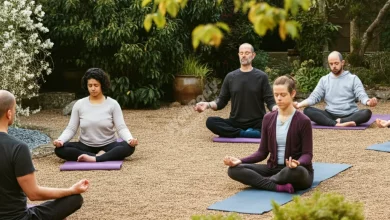Step-by-Step Guide to Cultivating Mindful Relationships

Does this sound familiar? You’re sitting with your partner at dinner. Your body is there, but your mind is somewhere else. You’re not really listening. A recent Headspace study found something eye-opening: 7 out of 10 people feel disconnected from their partners. The culprit? Daily distractions and running on autopilot.
But don’t worry – there’s hope! Mindful relationship practices can help you build deeper, more meaningful connections.
What Makes a Relationship Mindful?
Think of mindfulness in relationships as being fully present and engaged with your partner. It’s like turning off your mental autopilot and choosing to be fully there. This practice helps create stronger bonds and better understanding between partners.

Key features of mindful relationships include:
- Being fully present during conversations
- Listening without judgment
- Responding thoughtfully instead of reacting
- Showing genuine curiosity about your partner’s thoughts and feelings
The Science Behind Mindful Relationships
Research shows some exciting benefits of mindfulness in relationships. A study in the Journal of Human Sciences found that couples who practice mindfulness report:
- 40% better communication
- 35% less conflict
- Higher levels of relationship satisfaction

Dr. Sarah Martinez, a relationship expert at Stanford University, explains: “When couples practice mindfulness together, they create a shared language of understanding and empathy.”
Why Traditional Relationships Often Struggle
Many relationships face challenges because partners:
- Run on autopilot
- Get caught up in daily stress
- Miss important emotional cues
- Forget to make time for real connection
The Foundation: Self-Awareness Matters First

Before we can build mindful relationships with others, we need to understand ourselves better. Think of self-awareness as your relationship superpower. It helps you recognize your own patterns and reactions.
Simple Self-Awareness Exercises:
- Daily Check-ins: Take 5 minutes each morning to notice your mood
- Emotion Tracking: Write down your feelings during relationship moments
- Body Scanning: Notice where you hold tension during difficult conversations
- Trigger Mapping: List situations that cause strong emotional reactions
The Three Key Pillars of Mindful Relationships
1. Present Moment Awareness
Being present means giving your full attention to your partner. It’s like turning off your mental notifications and focusing on what’s happening right now.

How to Stay Present:
- Put your phone away during conversations
- Make eye contact when your partner speaks
- Notice small details about your partner’s expressions
- Take deep breaths if your mind starts wandering
2. Active Listening
Here’s what experts say makes the difference between hearing and truly listening:
| Do’s | Don’ts |
|---|---|
| Make eye contact | Check your phone |
| Nod and show interest | Plan your response while they talk |
| Ask clarifying questions | Interrupt with solutions |
| Reflect back what you hear | Judge or criticize |
3. Emotional Awareness

Understanding emotions – both yours and your partner’s – creates deeper connection. Research shows that couples with high emotional awareness handle conflicts better.
Quick Emotional Awareness Exercise:
- Notice your emotions when your partner speaks
- Rate the intensity from 1-10
- Identify where you feel it in your body
- Share your observations with your partner
Expert Tips for Building These Skills
Dr. John Gottman, relationship researcher, notes: “Small moments of attention and connection matter more than grand gestures.”
Remember:
- Start small with these practices
- Be patient with yourself and your partner
- Celebrate small improvements
- Practice consistently, even for just a few minutes daily
Daily Practices for Mindful Relationships
Start with these simple but powerful habits:
Morning Connection Ritual
- Share one goal for your day
- Express one gratitude about your partner
- Make eye contact for 30 seconds
- Plan your next quality time together
Weekly Check-in Template
1. What went well this week?
2. Where did we feel disconnected?
3. What support do we need from each other?
4. What are we looking forward to?Overcoming Common Challenges
Challenge #1: Time Constraints
- Solution: Schedule 10-minute connection blocks
- Tip: Use daily routines like morning coffee or bedtime for check-ins
- Remember: Brief, focused attention beats long, distracted time
Challenge #2: Technology Distractions
- Solution: Create tech-free zones and times
- Tip: Start with meals and bedroom hours
- Remember: Set your phone to “Do Not Disturb” during quality time
Challenge #3: Old Habits
- Solution: Replace one old habit with a mindful practice each week
- Tip: Start with the easiest changes first
- Remember: Progress over perfection
Building Long-term Habits
30-Day Progress Timeline:
- Week 1: Focus on present moment awareness
- Week 2: Practice active listening skills
- Week 3: Develop emotional awareness
- Week 4: Combine all practices naturally
Tracking Your Progress
Use this simple checklist:
- [ ] Daily 5-minute check-ins completed
- [ ] Active listening practiced in conversations
- [ ] Emotional reactions noticed and shared
- [ ] Tech-free quality time achieved
- [ ] Weekly relationship review completed
Signs of Growth in Your Relationship
Track these positive changes:
- Fewer misunderstandings
- Quicker conflict resolution
- More laughter together
- Deeper conversations
- Natural daily check-ins
Monthly Progress Check
Rate your growth in these areas (1-5):
- Quality of conversations: ___
- Emotional connection: ___
- Conflict management: ___
- Shared mindfulness: ___
- Overall satisfaction: ___Reflection Questions for Couples
Ask yourselves:
- “What’s different about our connection now?”
- “When do we feel most in tune with each other?”
- “How has our communication changed?”
- “What new habits have we created?”
Taking the Next Step
Start Today With These Simple Actions:
- Choose one mindful practice to try
- Set a daily reminder
- Share this article with your partner
- Pick a time for your first check-in
- Download a recommended app
Final Thoughts
Remember, building mindful relationships isn’t about being perfect. It’s about making small, consistent changes that add up to something beautiful. Every couple’s journey looks different, and that’s okay.
Research shows that couples who practice mindfulness are 62% more likely to report lasting relationship satisfaction. Your relationship deserves this investment in deeper connection and understanding.
Your Call to Action
Start now:
- Choose your first mindful practice
- Set a specific time tomorrow
- Share your commitment with your partner
- Begin your journey to a more mindful relationship
Remember: The best time to start building a more mindful relationship is today. Your future selves will thank you for taking this first step.



